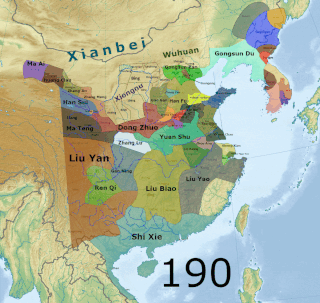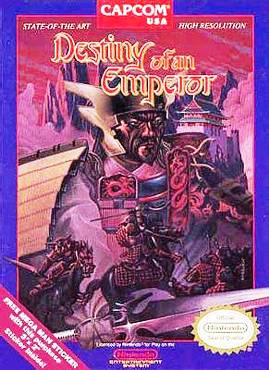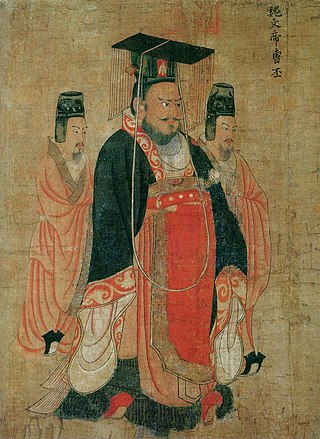
The Three Kingdoms of Cao Wei, Shu Han, and Eastern Wu dominated China from 220 to 280 AD following the end of the Han dynasty. This period was preceded by the Eastern Han dynasty and followed by the Western Jin dynasty. Academically, the periodisation begins with the establishment of Cao Wei in 220 and ends with the conquest of Wu by Jin in 280. The period immediately preceding the Three Kingdoms from 184 to 220 was marked by chaotic infighting among warlords across China as Han authority collapsed. The period from 220 to 263 was marked by a comparatively stable arrangement between Cao Wei, Shu Han, and Eastern Wu. This stability broke down with the conquest of Shu by Wei in 263, followed by the usurpation of Cao Wei by Jin in 266, and ultimately the conquest of Wu by Jin in 280.

Sun Quan, courtesy name Zhongmou (仲謀), posthumously known as Emperor Da of Wu, was the founder of Eastern Wu, one of the Three Kingdoms of China. He inherited control of the warlord regime established by his elder brother, Sun Ce, in 200. He declared formal independence and ruled from November 222 to May 229 as the King of Wu and from May 229 to May 252 as the Emperor of Wu. Unlike his rivals Cao Cao and Liu Bei, Sun Quan was much younger than they were and governed his state mostly separate of politics and ideology. He is sometimes portrayed as neutral considering he adopted a flexible foreign policy between his two rivals with the goal of pursuing the greatest interests for the country.

Romance of the Three Kingdoms is a 14th-century historical novel attributed to Luo Guanzhong. It is set in the turbulent years towards the end of the Han dynasty and the Three Kingdoms period in Chinese history, starting in 184 AD and ending with the reunification of the land in 280 by the Western Jin. The novel is based primarily on the Records of the Three Kingdoms, written by Chen Shou in the 3rd century.

Destiny of an Emperor, known in Japan as Tenchi wo Kurau, is a strategy role-playing game by Capcom for the Nintendo Entertainment System based on the Tenchi wo Kurau manga by Hiroshi Motomiya. It was originally released in Japan in 1989, with an English language localization released for the North American market in 1990.

Cao Pi, courtesy name Zihuan, was the first emperor of the state of Cao Wei in the Three Kingdoms period of China. He was the second son of Cao Cao, a warlord who lived in the late Eastern Han dynasty, but the eldest son among all the children born to Cao Cao by his concubine, Lady Bian. According to some historical records, he was often in the presence of court officials in order to gain their support. He was mostly in charge of defence at the start of his career. After the defeat of Cao Cao's rival Yuan Shao at the Battle of Guandu, he took Yuan Xi's widow, Lady Zhen, as a concubine, but in 221 Lady Zhen died and Guo Nüwang became empress.

Zhuge Liang, also commonly known by his courtesy name Kongming, was a Chinese statesman, strategist, and inventor who lived through the end of the Eastern Han dynasty and the early Three Kingdoms period (220–280) of China. During the Three Kingdoms period, he served as the Imperial Chancellor of the state of Shu Han (221–263) from its founding in 221 and later as regent from 223 until his death in September or October 234.

Wei was one of the major dynastic states in China during the Three Kingdoms period. The state was established in 220 by Cao Pi based upon the foundations laid by his father Cao Cao during the end of the Han dynasty. Its capital was initially located at Xuchang, and was later moved to Luoyang.

Han (漢; 221–263), known in historiography as Shu Han (蜀漢 ) or Ji Han (季漢 "Junior Han"), or often shortened to Shu (Chinese: 蜀; pinyin: Shǔ; Sichuanese Pinyin: Su2 < Middle Chinese: *źjowk < Eastern Han Chinese: *dźok), was a dynastic state of China and one of the three major states that competed for supremacy over China in the Three Kingdoms period. The state was based in the area around present-day Hanzhong, Sichuan, Chongqing, Yunnan, Guizhou, and north Guangxi, an area historically referred to as "Shu" based on the name of the past ancient kingdom of Shu, which also occupied this approximate geographical area. Its core territory also coincided with Liu Bang's Kingdom of Han, the precursor of the Han dynasty.

Wu, known in historiography as Eastern Wu or Sun Wu, was a dynastic state of China and one of the three major states that competed for supremacy over China in the Three Kingdoms period. It previously existed from 220 to 222 as a vassal kingdom nominally under Cao Wei, its rival state, but declared complete independence from Cao Wei in November 222. It was elevated to an empire in May 229 after its founding ruler, Sun Quan, declared himself emperor.
The Five Tiger Generals is a popular appellation in Chinese culture for the top five military commanders serving under one lord. Although the term does not appear in Chinese historical records and is not used officially, it has been heavily used in literature texts, folklore, as well as popular culture.

Dynasty Warriors 4 is a hack and slash video game and the fourth installment in the Dynasty Warriors series. Dynasty Warriors 4 was developed by Omega Force and published by Koei. The game is available on PlayStation 2 (PS2) and Xbox and is based on a series of books called Romance of the Three Kingdoms, written by Luo Guanzhong. As the series has progressed, it has strayed further from the actual plot of Romance of the Three Kingdoms but instead has given the user more input on how the storyline progresses. When it was released in Japan as Shin Sangokumusou 3, it topped the sales charts, sold over one million copies within nine days, and received an average of 78 out of 100 on Metacritics reviews.

The Records of the Three Kingdoms is a Chinese official history written by Chen Shou in the late 3rd century CE, covering the end of the Han dynasty and the subsequent Three Kingdoms period (220–280 CE). It is regarded as to be the authoritative source text for these periods. Compiled following the reunification of China under the Jin dynasty (266–420), the work chronicles the political, social, and military events within rival states Cao Wei, Shu Han and Eastern Wu into a single text organized by individual biography.

Warriors of Fate, known in Japan as Tenchi wo Kurau 2: Sekiheki no Tatakai, is a side-scrolling beat-'em-up game produced by Capcom. It is the second arcade game based on the Tenchi wo Kurau manga, following Dynasty Wars. Originally released to arcades in 1992, home versions of the Sega Saturn and PlayStation were released in 1996. A version for mobile phones followed in 2005. Capcom later included an emulated version of the arcade original as part of the Capcom Beat 'Em Up Bundle released digitally for the Nintendo Switch, PlayStation 4, Xbox One, and Windows in September 2018.

Tenchi wo Kurau II: Shokatsu Kōmei Den is a role-playing video game released in Japan by Capcom for the Famicom in 1991. It is the sequel to Destiny of an Emperor, originally based upon the manga Tenchi wo Kurau by Hiroshi Motomiya.

Kessen II is a strategy game loosely based on the Three Kingdoms period of China. It is the sequel to Kessen in name only; both Kessen and the later sequel Kessen III are based on events in Japan and China. The gameplay involves playing out major battles as the storyline progresses, with cutscenes between each battle for the development of the events and major characters. Before battle, players are given a choice of strategies to take, although they can manually control all units in the battlefield. All units are controlled by the AI unless the player directly intervenes, and battles between forces are carried out in real-time. While in control of a unit, players are able to use special skills or magic spells to turn the tables, although enemy characters are also able to do so.

The Chu Shi Biao refers to either of two memorials written by Zhuge Liang, the Imperial Chancellor of the state of Shu during the Three Kingdoms period of China. He presented them to Liu Shan, the second emperor of Shu. The first Chu Shi Biao, which is referred to as the "Former Chu Shi Biao", was presented in 227 before Zhuge Liang embarked on the first of a series of military campaigns against Shu's rival state, Wei. The second, known as the "Later Chu Shi Biao", was supposedly submitted in 228 before Zhuge Liang left for the second Northern Expedition.

Dynasty Wars, released in Japan as Tenchi wo Kurau, is a 1989 side-scrolling beat-'em-up game released for arcades by Capcom, based on the Japanese manga Tenchi wo Kurau and a reenactment of the battle between the Kingdom of Shu and the Yellow Turban rebels. Each of the two players can assume the roles of one of the four Chinese generals riding on horseback from the Three Kingdoms period in an attempt to smash the rebellion. A sequel, Warriors of Fate, was released in 1992.
The campaign against Yuan Shu was a punitive expedition that took place between 197 and 199 in the late Eastern Han dynasty. The campaign was initiated by the Han government against warlord Yuan Shu after Yuan declared himself emperor of the new Zhong dynasty, an act perceived as treason against Emperor Xian, the nominal Han ruler. The campaign concluded with the defeat of Yuan Shu and collapse of his self-established Zhong dynasty.
Jingzhou or Jing Province was one of the Nine Provinces of ancient China referenced in early Chinese texts such as the Tribute of Yu, Erya, and Rites of Zhou.














